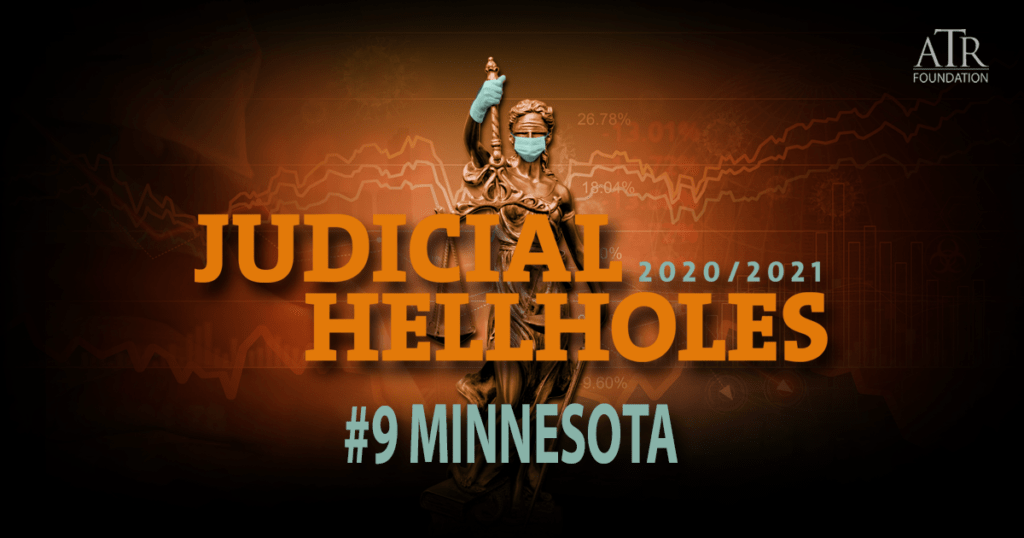‘Highly Unusual’ Rehearing of Louisiana Case Raises Judicial Independence Concerns
Louisiana Supreme Court Waffles Under Political Pressure, ATRA Brief Urges Court to Stand Strong

Activism in AG’s office, Supreme Court’s acceptance of lawsuit funding and loose venue rules to blame
Mischief in Minnesota’s civil justice system earned the state a spot among the nation’s “Judicial Hellholes.”
This year the designation expands to the entire state, after the Twin Cities were included two years in a row. The American Tort Reform Foundation (ATRF) named Minnesota to the No. 9 spot this year.
Judicial Hellholes are deemed the most unjust local courts and state civil justice systems in the country. The 2020 report ranks nine Judicial Hellholes while shining a light on lawsuit abuse and its effects.
Minnesota finds itself among the year’s Judicial Hellholes due to the state Supreme Court’s lax attitude toward third-party lawsuit funding, loose application of venue rules, and state Attorney General Keith Ellison’s crusade for regulation through litigation.
The state Supreme Court opened its doors to third-party lawsuit funding in the state this year. Third-party lawsuit funding is when lending firms or doctors invest with a lawyer or law firm, providing money to help fund lawsuits, in turn receiving a portion of any award or settlement funds. The Minnesota Supreme Court eliminated a common law rule called champerty that prevented a third party from receiving winnings from a lawsuit.
“Third-party funding of lawsuits is on the rise and is another avenue trial lawyers have discovered can pad their wallets even more,” American Tort Reform Association (ATRA) President Tiger Joyce said. “The state Supreme Court’s decision to abolish this law will lead to an increase in lawsuits and will leave Minnesota consumers vulnerable to lenders’ predatory practices.”
In fellow Judicial Hellhole New York City, lenders have charged clients up to 124% interest rates.
Further contributing to Minnesota’s ranking is a routine disregard for rules surrounding jurisdiction. Minnesota courts have allowed lawsuits to proceed against out-of-state businesses with no connection to Minnesota. One such case against Ford Motor Company is on appeal before the U.S. Supreme Court.
“If Minnesota’s decision regarding jurisdiction is upheld, businesses will face lawsuits all across the country in state courts they have little to no connection with, thereby creating a far less predictable business climate,” Joyce said.
State AG Keith Ellison shoulders part of the responsibility for his state’s ranking as a Judicial Hellhole. AG Ellison has sought to place the blame for climate change on the backs of energy companies and is attempting to regulate their practices through litigation.
While many climate lawsuits claim public nuisance, AG Ellison has found new, novel ways to sue. His lawsuits allege consumer fraud, deceptive trade practices, and false advertising. AGs in fellow Judicial Hellhole New York, Rhode Island, and Massachusetts have filed similar lawsuits.
“AG Ellison is really a political insider,” Joyce said. “After more than a decade in Congress, he was elected as the state’s chief legal officer. Ellison quickly got to work attacking the energy industry with lawsuits, alleging fraud against the state’s residents related to climate change.”
Further, AG Ellison is under fire over allegations that his lawsuits against energy companies were motivated by outside interests involving billionaire Michael Bloomberg. The State Energy & Environmental Impact Center (SEEIC) at NYU’s School of Law is largely funded by Bloomberg. SEEIC’s fellows are lawyers who are then farmed out to state attorneys general offices to focus on environmental issues, including suing energy companies over their role in creating climate change. SEEIC’s website shows their fellows are placed in the Minnesota AG office, and even though they are full staff members of the AG office, their salaries are paid by the SEEIC.
“The practice of allowing private interests to pay their way into positions of authority in state government offices does not serve the public interest,” Joyce said. “It raises significant ethical concerns and puts government employees in a position in which they are serving two masters – and one will always win out.”
ATRA released a report last year on the embedding of outside attorneys and activists in government offices.
The full 2020-2021 Judicial Hellholes rankings are:
View the full report at JudicialHellholes.org.
Louisiana Supreme Court Waffles Under Political Pressure, ATRA Brief Urges Court to Stand Strong
Left unchecked, these jurisdictions will continue dragging down economic growth and undermining justice through rampant lawsuit abuse.
Claimants Given Opportunity to Vote on Plan; Judge to Reconsider Scientific Validity of Plaintiffs’ Experts
Legitimate consumer protection demands sound science and impartial analysis — not distorted data designed to manufacture lawsuits.
Law Firms Spent $168M+ on 2.2M Ads in Georgia
ATRA’s Latest Studies Reveal Financial Influence and Lack of Transparency in Pennsylvania’s Campaign Finance Systems